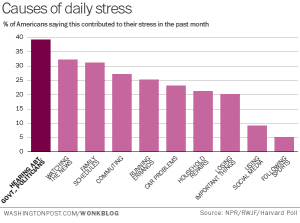According to Gallup, Americans now identify “government” as the most important problem facing the United States.
That doesn’t surprise.  Gallup also found last year that big government is considered a far greater danger to the nation that big business or big labor.
Gallup also found last year that big government is considered a far greater danger to the nation that big business or big labor.
Moreover, a poll from NPR earlier this year found that government was the leading cause of stress in people’s lives.
And Gallup discovered earlier this year that a record number of Americans think that government is corrupt.
So why do Americans have such a dour view of officialdom?
Well, let’s look at one example. The Wall Street Journal has a devastating editorial about dishonest and unethical behavior by federal and state bureaucracies.
The column starts with a strong assertion.
Prosecutorial misconduct has become an ugly commonplace of modern government, manipulating the legal system to attack easy political targets.
It’s one that many people recognize is accurate, and probably helps to explain why pollsters now find the kinds of results cited above.
But if you think the WSJ is exaggerating or that people are misguided for being hostile to government, just check out how Andy Johnson, Anthony Smelley, Charlie Engle, Tammy Cooper, Nancy Black, Russ Caswell, Jacques Wajsfelner, Jeff Councelller, Eric Garner, Martha Boneta, Carole Hinders,Salvatore Culosi, and James Lieto were victimized by bureaucrats run amok.
But I’m digressing. Let’s get to this newest case. It deals with a forest fire in California and subsequent efforts for federal and state bureaucracies to blame a private company and extort some of the firm’s cash and land.
The story began in 2007 with the Moonlight Fire in California that burned some 65,000 acres, about two-thirds on federal land. Within 48 hours and while the flames were still burning, the state’s department of forestry and fire protection, known as Cal Fire, and the U.S. Forest Service blamed the disaster on Sierra Pacific, a Redding-based company that owns some 1.2 million acres of timberland. In 2009 a federal-state task force brought official complaints against the company and nearby landowners. California officials filed an action in state court while prosecutors sued for $1 billion in federal court. Sierra Pacific has insisted it didn’t start the fire but, faced with an open-ended legal fight, the company in 2012 settled the federal case for $55 million and a deed of some 22,500 acres to the U.S. government.
So far, so good, at least from the federal government’s perspective.
But there was still the case that was filed in state court, which presumably represented another attempt to extort more money from Sierra Pacific.
And this is where the government screwed up, whether through greed or incompetence (probably both). The WSJ has some of the sordid details that have been unearthed.
…the state case continued, and it has exposed a fiasco of fraud and corruption… Among other problems, government investigators and prosecutors doctored reports, misrepresented facts and retaliated against employees whose questions threatened their strategy. …According to the theory implicating the company, the fire started when the blade of a Sierra Pacific bulldozer hit a rock and created a spark. Government investigators pinpointed a location and claimed they had confirmation from a bulldozer driver. Problem was, both the fire’s alleged point of origin and the scenario to buttress it were fraudulent. When the company questioned the bulldozer driver, he denied having made the statement and admitted he couldn’t have confirmed the statement prosecutors had him sign because he didn’t know how to read. Prosecutors were also dishonest about where the fire started. Overhead videos have shown that the point of origin marked by the government was well outside the visual boundaries of the burning forest nearly an hour after the fire started.
I’m tempted at this point to make some snarky joke, but this issue is far too serious. When the government prevaricates in legal proceedings, that undermines the rule of law and call into question the integrity of the entire system.
And the column reveals that there was corruption and mendacity at both the state and federal level.
A second federal prosecutor, Eric Overby, joined the case in 2011, only to withdraw promptly on discovering what he called prosecutorial abuse directed squarely at raising revenue. He told defense counsel that in “my entire career, I have never seen anything like this. Never.” In February 2014, California state Judge Leslie Nichols assailed the federal and state government for abuses of discovery so “reprehensible” and “egregious” that they “threatened the integrity of the judicial process.” He threw out the case and awarded Sierra Pacific $30 million in sanctions against Cal Fire.
There are still reverberations from the case as Sierra Pacific is seeking to void the agreement that was made (based on lies) with the federal government. Needless to say, one hopes the company will win.
But there’s something else that needs to happen. The corrupt government officials need to be penalized, ideally with criminal sanctions including jail time. The government’s lawyers also should be disbarred and lose their jobs.
Punishment is the right approach, both because it is deserved and because it’s the only way of sending an effective signal to other bureaucrats that there is a personal risk to government malfeasance.
I also think Sierra Pacific, like any other victimized party, deserves compensation. Unfortunately, that money would come from taxpayers when it should be deducted from the budgets of the misbehaving bureaucracies (and the salaries of the bureaucrats).
